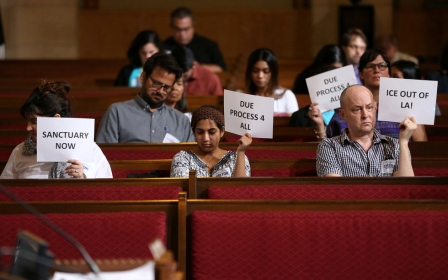US judge sides with 'sanctuary cities' in Trump immigration battle

A federal judge on Friday barred the US Justice Department from denying public-safety grants to so-called sanctuary cities that limit cooperation with the Trump administration's crackdown on illegal immigration.
The preliminary injunction issued by US District Judge Harry Leinenweber was in response to a legal challenge brought by Chicago, the third-largest city in the United States, but the judge ruled that his order would be applied on a nationwide basis.
Chicago sued in August after US Attorney General Jeff Sessions announced that the Justice Department would bar cities from receiving certain grants unless they allowed federal immigration authorities unlimited access to local jails and provided 48 hours' notice before releasing anyone wanted for immigration violations.
Chicago Mayor Rahm Emanuel hailed the decision at a City Hall news conference as "an affirmation of the rule of law."
"It’s an assertion of our most fundamental American values and it’s an unambiguous, clear rejection of the false choice that the Trump Justice Department wanted Chicago to make between our values, our principles and our priorities,” Emanuel said.
President Donald Trump has made tougher immigration enforcement a centerpiece of his campaign and presidency, along with a pledge to build a wall on the US-Mexican border.
As part of that policy, the Justice Department has sought to punish cities and other local jurisdictions that have joined a growing "sanctuary" movement aimed at shielding illegal immigrants from stepped-up deportation efforts.
In granting his injunction, Judge Leinenweber found that the city of Chicago has established "a likelihood of success" in prevailing on the merits of its case once the lawsuit is considered in its entirety.
In April, a US federal judge blocked also Trump's executive order that sought to withhold federal funds from so-called sanctuary cities for immigrants.
The ruling from US District Judge William Orrick III in San Francisco said Trump's order targeted broad categories of federal funding for sanctuary governments, and that plaintiffs challenging the order were likely to succeed in proving it unconstitutional.
Orrick said the order, one of the first Trump issued after becoming president, was against the public interest and did not stand up under the Constitution.
More than 400 places throughout the US have some sort of sanctuary policy, although there is no consensus about either the definition or the guidelines. While some locations have not formally declared themselves sanctuaries, many have publicly stated they won't comply with the executive order. In the Bay Area alone, that includes San Francisco, Santa Cruz, Alameda, Oakland and San Jose.
Police agencies in those jurisdictions have generally barred their officers from routinely checking individuals' immigration status when making arrests or traffic stops. And they have refused to keep anyone locked up longer than otherwise warranted at the request of federal agents seeking to deport them.
Trump's opponents say there is no correlation between immigration and violent crime, citing a sharp drop in homicides in Los Angeles since the early 1990s, despite embracing the sanctuary cities movement.
The Justice Department grants at issue typically are used to help police improve crime-fighting techniques, buy new equipment and assist victims of crime.
Stay informed with MEE's newsletters
Sign up to get the latest alerts, insights and analysis, starting with Turkey Unpacked
Middle East Eye delivers independent and unrivalled coverage and analysis of the Middle East, North Africa and beyond. To learn more about republishing this content and the associated fees, please fill out this form. More about MEE can be found here.




